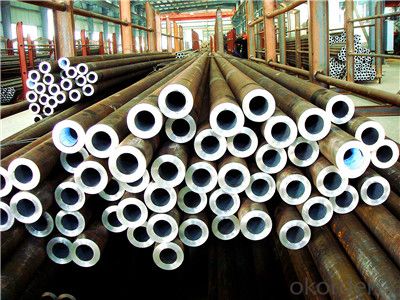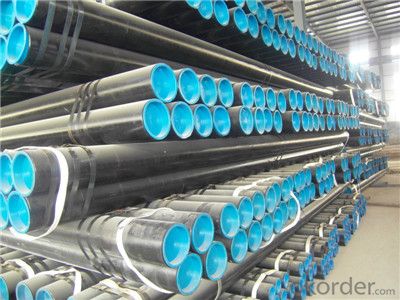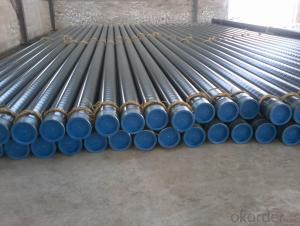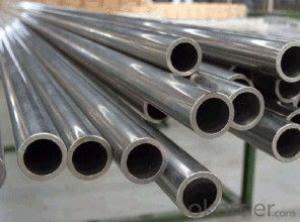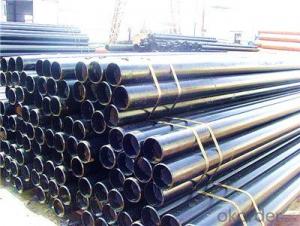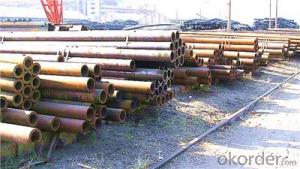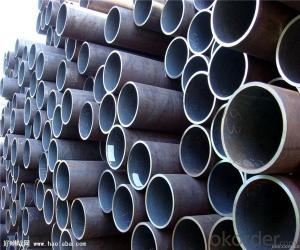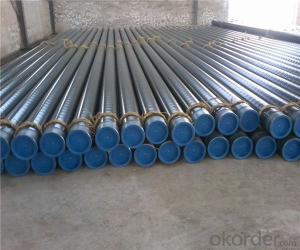Seamless Steel Pipe with Low Price and High Quality
- Loading Port:
- Tianjin
- Payment Terms:
- TT OR LC
- Min Order Qty:
- 50 m.t.
- Supply Capability:
- 2000000 m.t./month
OKorder Service Pledge
OKorder Financial Service
You Might Also Like
PRODUCT DETAILS
1.Structure of Seamless Steel Pipe Description:
A large amount of Seamless Steel Pipes is offered to the clients at cost effective rates. These pipes are extremely durable, resistant to corrosion and have high tensile strength. Our pipes are used in nuclear plants, power plants, refineries and construction industry across the country. Furthermore, we are capable of providing these seamless pipes to the clients in bulk quantity.
2.Packaging & Delivery:
| Packaging Details: | Seaworthy packages, bundles wrapped with strong steel strip |
| Delivery Detail: | 15-30 days after received 30% TT |
3.Seamless Steel Pipe Specification:
| Standard: | GB, DIN, ASTM,ASME, ASTM A106-2006, ASTM A53-2007 |
| Grade: | 10#,20#, 45#, 16Mn |
Thickness: | 8 - 33 mm |
| Section Shape: | Round |
| Outer Diameter: | 133 - 219 mm |
| Place of Origin: | Shandong, China (Mainland) |
| Secondary Or Not: | Non-secondary |
| Application: | Hydraulic Pipe |
| Technique: | Cold Drawn |
| Certification: | API |
| Surface Treatment: | factory state or painted black |
| Special Pipe: | API Pipe |
| Alloy Or Not: | Non-alloy |
| Length: | 5-12M |
| Outer Diameter: | 21.3-610mm |
4.Product pictures
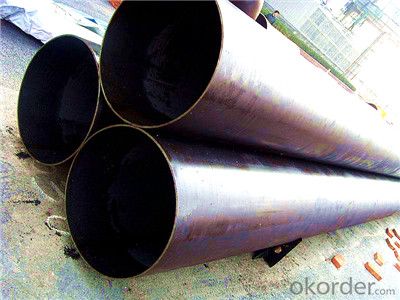
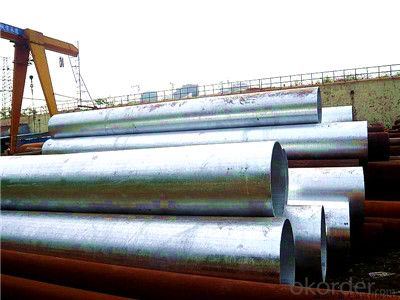
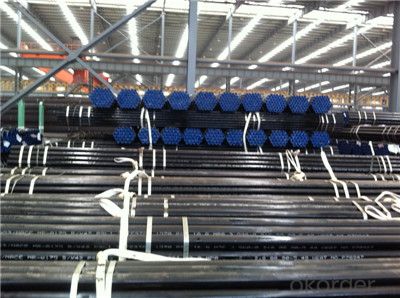
5.FAQ of Seamless steel pipe:
①How is the quality of your products?
Our products are manufactured strictly according to national and internaional standard, and we take a test
on every pipe before delivered out. If you want see our quality certifications and all kinds of testing report, please just ask us for it.
Guaranteed: If products’ quality don’t accord to discription as we give or the promise before you place order, we promise 100% refund.
③Why should you chose us?
Chose happens because of quality, then price, We can give you both.Additionally, we can also offer professional products inquiry, products knowledge train(for agents), smooth goods delivery, exellent customer solution proposals.Our service formula: good quality+good price+good service=customer’s trust.
SGS test is available, customer inspection before shipping is welcome, third party inspection is no problem.
Any question, pls feel free to contact us !
- Q: What are the different sizes of steel pipe nipples?
- Steel pipe nipples come in a variety of sizes, ranging from 1/8 inch to 6 inches in diameter.
- Q: Are steel pipes suitable for semiconductor manufacturing plants?
- Yes, steel pipes are appropriate for use in semiconductor manufacturing plants. Steel pipes are renowned for their durability, strength, and resistance to corrosion, making them an exceptional option for a variety of industrial applications, including semiconductor manufacturing. Within semiconductor manufacturing plants, a range of chemicals and gases are employed throughout the production process. Steel pipes possess a high degree of resistance to corrosion and can endure the harsh chemicals and gases typically encountered in semiconductor manufacturing environments, thereby ensuring the integrity and longevity of the piping system. Moreover, steel pipes are capable of withstanding high-pressure conditions, which are frequently required in semiconductor manufacturing plants. They exhibit excellent mechanical properties and can endure heavy loads and stress, rendering them dependable for the transportation of fluids and gases under high pressure. Another benefit of steel pipes is their adaptability in terms of size and shape. Semiconductor manufacturing plants often necessitate a complex and intricate piping system to accommodate diverse processes and equipment. Steel pipes can be easily customized and fabricated to meet specific requirements, enabling efficient and seamless integration into the infrastructure of the plant. In summary, steel pipes possess the necessary qualities and characteristics for use in semiconductor manufacturing plants. Their durability, resistance to corrosion, high-pressure capabilities, and flexibility make them a suitable choice for the transportation of chemicals and gases in this industry.
- Q: Fastener type steel pipe scaffold external parts name
- Fastener type steel pipe scaffold fastener malleable iron casting should be adopted, its basic form has three kinds: vertical cross bar for a connection between the rectangular fastener, fastener for rotating connecting parallel or oblique bars and rods for butt joint butt joint fastener.
- Q: How do you join two steel pipes together without welding?
- One way to join two steel pipes together without welding is by using threaded connections. This involves screwing a threaded fitting onto each end of the pipes, creating a secure and durable connection. Additionally, other methods such as mechanical couplings or flanges can also be used to join steel pipes without welding. These methods provide a reliable and convenient alternative to welding for joining steel pipes together.
- Q: How are steel pipes used in the manufacturing of chemical storage tanks?
- Steel pipes are used in the manufacturing of chemical storage tanks for their durability, strength, and resistance to corrosion. These pipes are utilized for the construction of the tank's framework, as well as for the transport of chemicals within the tank. The steel pipes provide a reliable and secure infrastructure, ensuring the safety and integrity of the chemicals stored inside the tank.
- Q: Can steel pipes be used for transportation of hazardous materials?
- Steel pipes can indeed be used for the transportation of hazardous materials. Steel is known for its strength, durability, and resistance to corrosion, making it suitable for handling and transporting a wide range of hazardous substances. This includes flammable liquids, toxic chemicals, and other dangerous materials. Steel pipes used for the transportation of hazardous materials are often specially designed and constructed to meet stringent safety regulations and industry standards. They are typically made from high-quality steel alloys and undergo rigorous testing to ensure their integrity and resistance to leaks or ruptures. Furthermore, steel pipes can be manufactured with additional protective coatings or linings to provide an extra layer of security and prevent any potential reactions between the hazardous material and the steel. These coatings can also help to minimize the risk of corrosion and extend the lifespan of the pipes. Overall, steel pipes have a proven track record in the transportation of hazardous materials due to their inherent strength, durability, and ability to withstand the harsh conditions often encountered during transportation. However, it is crucial to follow proper handling, storage, and transportation protocols to ensure the safety of both the materials being transported and the individuals involved in the process.
- Q: How are steel pipes sized and classified?
- Steel pipes are sized and classified based on their outer diameter, wall thickness, and length. The sizing is done using standard measurements such as nominal pipe size (NPS) or nominal diameter (DN). Classification is determined by factors such as the pipe's pressure rating, material composition, and intended use. This helps ensure compatibility and proper installation in various applications such as plumbing, construction, and industrial processes.
- Q: What is the difference between hot-dip galvanizing and electroplating for steel pipes?
- Hot-dip galvanizing and electroplating are both methods used to protect steel pipes from corrosion, but they differ in the process and the properties of the resulting coating. Hot-dip galvanizing involves immersing the steel pipe in a bath of molten zinc, which forms a thick and durable coating that bonds metallurgically with the steel. This provides excellent corrosion resistance and protection even in harsh environments. On the other hand, electroplating involves the deposition of a thin layer of zinc onto the steel pipe using an electric current. While electroplating also offers corrosion protection, the coating is typically thinner and less durable than hot-dip galvanizing. Hot-dip galvanizing is typically preferred for steel pipes that require long-lasting protection, while electroplating may be suitable for applications where a thinner coating is sufficient.
- Q: How are steel pipes classified based on their diameter?
- Steel pipes are classified based on their diameter by categorizing them into different size ranges, such as small diameter pipes, medium diameter pipes, and large diameter pipes.
- Q: Can steel pipes be used for structural purposes?
- Yes, steel pipes can be used for structural purposes. Due to their high strength, durability, and resistance to various environmental factors, steel pipes are commonly used in construction for applications such as supporting structures, frames, and columns. They offer superior load-bearing capacity and are especially suitable for use in large-scale infrastructure projects.
Send your message to us
Seamless Steel Pipe with Low Price and High Quality
- Loading Port:
- Tianjin
- Payment Terms:
- TT OR LC
- Min Order Qty:
- 50 m.t.
- Supply Capability:
- 2000000 m.t./month
OKorder Service Pledge
OKorder Financial Service
Similar products
Hot products
Hot Searches
Related keywords




